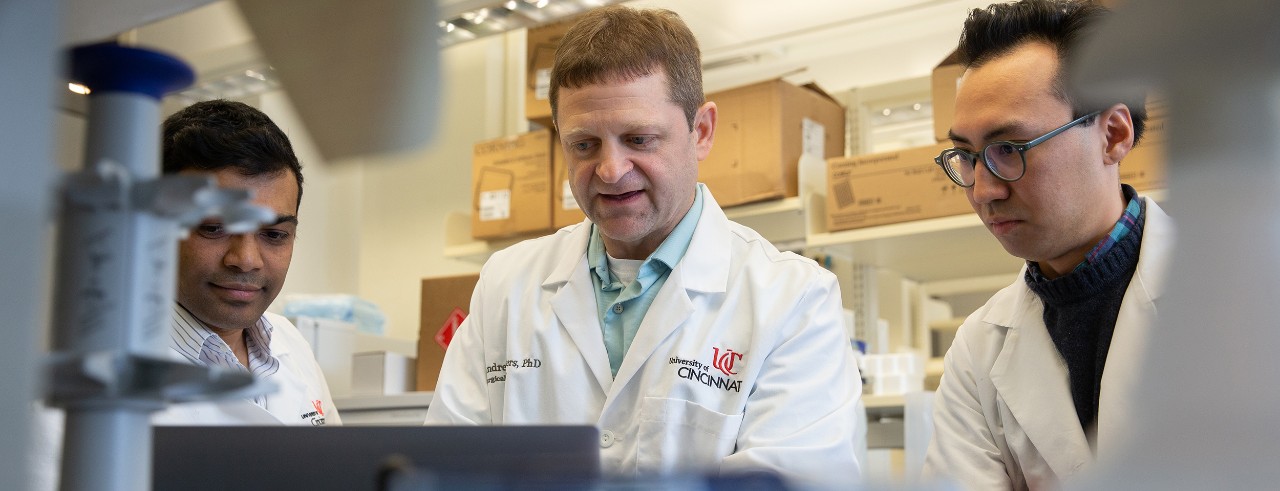
Local 12 highlights Pancreatic Cancer Awareness Month
Pancreatic cancer diagnoses are increasing more rapidly than any other cancer type while remaining one of the most deadly cancers.
The American Cancer Society estimates approximately 64,000 Americans will be diagnosed with pancreatic cancer this year, and approximately 50,500 people in the U.S. will die of pancreatic cancer in 2023. While currently the third-leading cause of cancer death in the United States, pancreatic cancer is expected to become the second-leading cause of cancer death by 2030, highlighting the need for new and innovative treatments.
During Pancreatic Cancer Awareness Month in November, the University of Cincinnati's Andrew Waters, PhD, joined Local 12's What's Happening in Health program to discuss the state of pancreatic cancer research.
"Now what I'm working on, there's been milestone advancements, and we have these drugs that are going through clinical trials here in the Cincinnati area," said Waters, University of Cincinnati Cancer Center researcher and assistant professor in the UC College of Medicine’s Department of Surgery, Division of Surgical Oncology and Department of Cancer Biology. "And what I'm trying to understand is how these cells when treated with this drug kind of adapt and develop resistance to the drug. Because we know it's going to be combination therapies that are necessary to really extend the lives of pancreatic cancer patients and the efficacy of this new class of drugs in the clinic."
Waters was joined by volunteers from the Pancreatic Cancer Action Network, who raise funds to support research, including at the Cancer Center.
"Finding this disease early, if possible, will really help increase the odds. Your chance of survival goes up from 12% for five-year survival to 33% if you can find the disease early,” said Sherry Holcomb, mission chair of the local chapter of the Pancreatic Cancer Action Network.
Watch or read the Local 12 story.
Read more about Waters' research.
Featured photo at top: Researchers Krushna Patra, Andrew Waters and Patrick Krause review data. Photo/Andrew Higley/UC Marketing + Brand.
Related Stories
President picks exceptional talent
April 28, 2021
The University of Cincinnati 2021 Presidential Leadership Medal of Excellence Awards honor six undergraduate scholars for scholarship, leadership, character, service and the ideals of the university. Awardees are spotlighted for exceptional academics, creativity, community service and innovation.
Grad students earn president's highest honor
April 28, 2021
The University of Cincinnati 2021 Presidential Medal of Graduate Student Excellence Awards honor three graduate scholars for scholarship, leadership, character, service and the ideals of the university. Awardees are spotlighted for exceptional academics, creativity, community service and innovation.
Finding community and building a future
July 9, 2021
As a University of Cincinnati College of Medicine student, Sarah Appeadu, MD, ’21, remembers journaling on the “3 Cs” that got her through medical school: Community, community, community. Now, when she lists the people who supported her through four years of training—the last year in a global pandemic—it keeps growing: her family, her church, her classmates, and the college’s Office of Student Affairs and Office of Diversity, Equity and Inclusion. “I look back and it was such a crucial time to really be nurtured in that way,” she says. “I’m so thankful that I had those people. It shows being around the right people really mattered. That’s my same hope for residency even.”
UC to honor 2,079 grads at summer Commencement
August 2, 2021
UC celebrates the 2021 summer Commencement on Friday in two ceremonies at Fifth Third Arena. On Saturday, UC will recognize 2020 grads with an in-person Commencement celebration.
New York Times: Flint Weighs Scope of Harm to Children Caused by Lead in Water
February 1, 2016
Kim Dietrich, a professor of environmental health at UC's College of Medicine, is quoted in this story on the medical problems that could develop among the thousands of young children exposed to lead-contaminated water in Flint, Mich.
Cancer-Causing Gene Found in Plasma May Help Predict Outcomes for Patients
February 18, 2016
Researchers at the University of Cincinnati have discovered that a human cancer-causing gene, called DEK, can be detected in the plasma of head and neck cancer patients.
UC Receives $1.9 Million to Study Pain
February 15, 2016
Jun-Ming Zhang, MD, of the UC College of Medicine, is the principal investigator of a $1.95 million grant to study the interacting roles of the sympathetic and sensory nervous and immune systems in back and neuropathic pain models.
MD Magazine: Generic Drug Equally Effective in Epilespy
February 22, 2016
Michael Privitera, MD, a professor of neurology at UC's College of Medicine and director of the Epilepsy Center at the UC Neuroscience Institute, is featured in this story about research he led that examined the efficacy of generic drug substitution for epilepsy.
UC to Host Regional Conference for Latino Medical Student Association
February 10, 2016
The University of Cincinnati chapter of the Latino Medical Student Association (LMSA) will host a Midwest regional conference Feb. 26-28, 2016, at the College of Medicine.
Heart Disease Still Top Killer of American Women and Men, Symptoms Differ
February 1, 2016
Women tend to get palpitations, shortness of breath and "sharp" chest pain when suffering heart attacks, explains Stephanie Dunlap, DO, in the UC College of Medicine.
